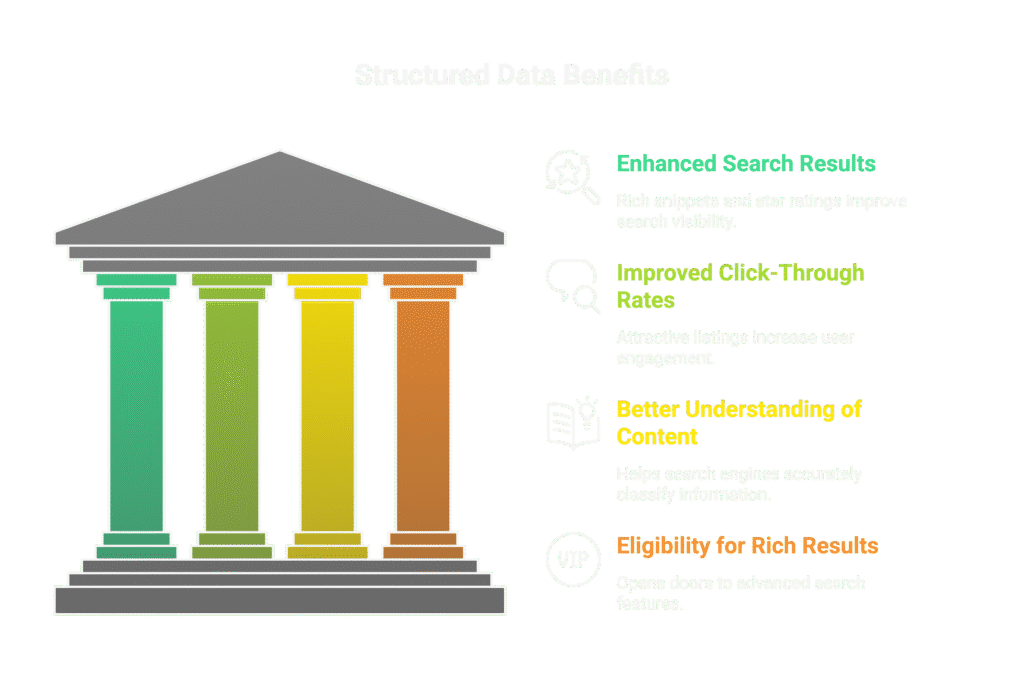If you want to stand out in Google’s search results, structured data for SEO is one of the most powerful tools you can use. Structured data helps improve your technical seo by making search engines understand your website’s content more precisely, leading to enhanced search results known as rich snippets.
In this extended guide, we’ll explore what is structured data SEO, its benefits, and how to implement it effectively with real-world structured data SEO examples, plus advanced schema types to elevate your site’s visibility.
What Is Structured Data in SEO?
Structured data is a standardized format (often using Schema.org vocabulary) that provides explicit clues about the meaning of a webpage. It’s added to the HTML of a page to help search engines:
- Understand the content type (e.g., recipe, event, product)
- Display enhanced search features (rich snippets)
Example of structured data (JSON-LD for a product):
{
"@context": "https://schema.org/",
"@type": "Product",
"name": "Organic Dog Treats",
"image": "https://example.com/dog-treats.jpg",
"description": "Healthy organic dog treats with no artificial ingredients.",
"brand": {
"@type": "Brand",
"name": "Healthy Paws"
},
"offers": {
"@type": "Offer",
"priceCurrency": "USD",
"price": "14.99",
"availability": "https://schema.org/InStock"
}
}
Why Structured Data Matters for SEO
- Enhanced Search Results: Rich snippets, star ratings, FAQs, events, and more.
- Improved Click-Through Rates: More attractive listings can lead to higher CTR.
- Better Understanding of Content: Helps search engines classify and display information accurately.
- Eligibility for Rich Results: Certain structured data types make your page eligible for rich result features.

Common Types of Structured Data for SEO
- Organization: Name, logo, contact info
- Local Business: Address, phone number, hours
- Product: Price, availability, reviews
- FAQPage: Frequently asked questions
- Article / BlogPosting: Headlines, author, publish date
- Event: Event name, date, location
- Recipe: Ingredients, cooking time, nutritional info
Advanced Schema Types for Greater SEO Impact
- Review: Display star ratings in search results.
{
"@context": "https://schema.org",
"@type": "Review",
"author": {
"@type": "Person",
"name": "John Doe"
},
"itemReviewed": {
"@type": "Product",
"name": "Premium Coffee Beans"
},
"reviewRating": {
"@type": "Rating",
"ratingValue": "5",
"bestRating": "5"
}
}
- HowTo: Perfect for tutorials or guides.
{
"@context": "https://schema.org",
"@type": "HowTo",
"name": "How to Change a Flat Tire",
"step": [
{"@type": "HowToStep", "text": "Loosen the lug nuts."},
{"@type": "HowToStep", "text": "Lift the car with a jack."},
{"@type": "HowToStep", "text": "Remove the flat tire and replace with a spare."}
]
}
- Service: Highlight specific services your business offers.
{
"@context": "https://schema.org",
"@type": "Service",
"serviceType": "Website Design",
"provider": {
"@type": "Organization",
"name": "Digital Marketing Mavericks"
}
}
Structured Data SEO Examples
- Local Business Example: Adding LocalBusiness schema to your homepage can improve visibility in map results.
- Product Example: E-commerce sites use Product schema to display pricing, reviews, and stock status.
- FAQ Example: FAQPage schema lets you show expandable questions in SERPs.
- HowTo Example: Guides can appear as rich results with step-by-step visuals.
How to Implement Structured Data for SEO
1. Choose the Right Schema Type
Visit Schema.org to select the correct schema type for your content.
2. Add JSON-LD Markup
Google recommends JSON-LD format placed in the <head> or <body> of your HTML.
3. Test Implementation
Use Google’s Rich Results Test or Schema Markup Validator to confirm correct formatting.
4. Monitor in Google Search Console
Use the Enhancements report to catch structured data warnings or errors.

Best Practices for Structured Data and SEO
- Mark up only visible, relevant content.
- Keep schema data updated (e.g., prices, dates, reviews).
- Validate often using Google’s tools.
- Avoid over-marking or adding irrelevant markup.
- Pair structured data with strong on-page SEO.
FAQ: Structured Data in SEO
Q: What is structured data SEO?
A: It’s the use of structured data markup to help search engines understand your site’s content and enhance its display in results.
Q: Does structured data improve rankings?
A: It doesn’t directly improve rankings, but it can increase CTR and user engagement, which indirectly benefits SEO.
Q: How do I add structured data in WordPress?
A: Use plugins like Yoast SEO, Rank Math, or Schema Pro for simplified markup.
Q: What is an example of structured data in SEO?
A: FAQ schema, Product schema, and HowTo schema are common structured data examples.
Final Thoughts
Adding structured data for SEO is a proven way to make your site stand out in search results. Whether you’re a local business, e-commerce store, or content publisher, using structured data properly can lead to more clicks and stronger search performance.
If you want expert help implementing SEO structured data, we can create a tailored schema strategy to maximize your site’s visibility in search.

